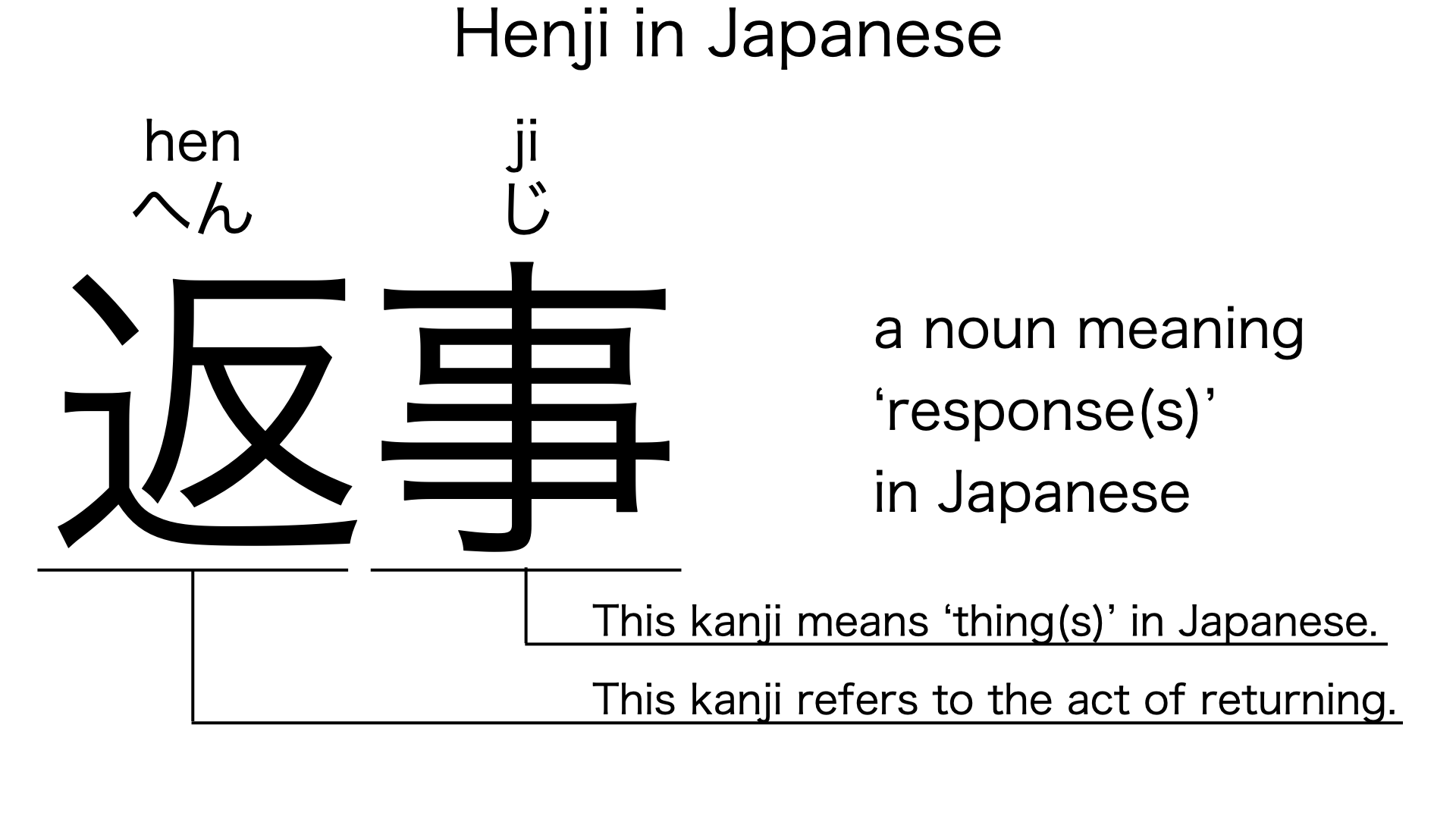What does “henji” mean in Japanese?
Native speakers say “henji” often to mean ‘response’ in Japanese. Perhaps, some Japanese learners know this word as it is sometimes used in Japanese conversations. In this blog post, however, I will explain this word in detail based on its kanji expression. And also, I will explain how to use it through example sentences. My explanations would help Japanese learners understand “henji” more clearly. Then, let’s get started!
Contents
Definition and meanings of “henji”
Let me start with the definition and meanings of “henji”.
- henji – 返事 (へんじ) : a noun meaning ‘response’, ‘reply’, or ‘answer’ in Japanese. This can also work as plural. Learn more about Japanese plural.
The definition and meanings are not that difficult, I think. The meanings seem to be based on the same idea. To understand this noun more clearly, however, let me explain its kanji characters in detail, one by one.
What does “henji” literally mean in Japanese?
The kanji expression of “henji” consists of the following two kanji characters:
- 返 : a kanji character often used to refer to the act of returning.
- 事 : a kanji character often used to mean ‘thing’ in Japanese.
From these two kanji characters, we can understand that “henji” literally means ‘returning things’ in Japanese. This literal interpretation is not completely in line with the actual meanings, but still understandable, I think. Responses, replies, and answers can be considered as things returning from listeners and readers.

When we meet new kanji expressions, we should check their kanji characters in detail to understand their meanings clearly and deeply. In many cases, kanji characters tell us a lot about the meanings of the expressions they form. Actually, here, we could get the better understanding of “henji” through the detailed kanji check above.
So far, I’ve explained the definition and meanings of “henji” together with its kanji characters. Then, let me explain how to use it through the example sentences below.
Example #1: how to say “reply” in Japanese
watashi wa kinou henji wo kai ta – 私は昨日返事を書いた (わたしはきのうへんじをかいた)
I wrote a reply yesterday.
Below are the new words used in the example sentence.
- watashi – 私 (わたし) : a pronoun meaning ‘I’ in Japanese.
- wa – は : a binding particle working as a case marker or topic marker. In the example, this works after “watashi” to make the subject in the sentence.
- kinou – 昨日 (きのう) : a noun meaning ‘yesterday’ in Japanese. This can also work as an adverb almost anywhere in a sentence. In the example, this works as an adverb in the middle of the sentence to say “yesterday” in Japanese.
- wo – を : a case particle used to make the object word in a sentence. In the example, this is used after “henji” to make the object in the sentence.
- kai – 書い (かい) : one conjugation of the verb, “kaku”, which means ‘to write’ in Japanese. In the example, it has been conjugated for the better connection with its following word.
- ta – た : an auxiliary verb used after a verb, adjective, or auxiliary verb to make its past tense form. In the example, this is used after “kai” to make its past tense form, “kai ta”.
This is a typical usage of “henji”. In this example, it works together with the case particle, “wo”, to become the object in the sentence.
Example #2: another usage of “henji”
kyou kanojo kara henji ga ki ta – 今日彼女から返事が来た (きょうかのじょからへんじがきた)
I received her reply today.
Below are the new words used in the example sentence.
- kyou – 今日 (きょう) : a noun meaning ‘today’ in Japanese. This can also work as an adverb almost anywhere in a sentence. In the example, this works as an adverb at the beginning of the sentence to say “today” in Japanese.
- kanojo – 彼女 (かのじょ) : a pronoun meaning ‘she’ in Japanese.
- kara – から : a case particle used to say where someone or something comes from. In the example, this is used after “kanojo” to say from whom the speaker received the reply.
- ga – が : a case particle used to make the subject word or the object word in a sentence. In the example, this is used after “henji” to make the subject in the sentence.
- ki – 来 (き) : one conjugation of the verb, “kuru“, which means ‘to come’ in Japanese. In the example, it has been conjugated for the better connection with its following word.
This is another typical usage of “henji”. In this example, it works together with “ga” to become the subject in the sentence.
The original meaning of the Japanese sentence is more like “the reply from her arrived today”, but it has been translated more naturally.
Summary
In this blog post, I’ve explained the definition and meanings of “henji” in detail based on its kanji expression. And also, I’ve explained how to use it through the example sentences. Let me summarize them as follows.
- henji – 返事 (へんじ) : a noun meaning ‘response’, ‘reply’, or ‘answer’ in Japanese. This can also work as plural. These two kanji characters literally mean ‘returning things’ in Japanese. This literal interpretation is not completely in line with the actual meanings, but still understandable, I think. Responses, replies, and answers can be considered as things returning from listeners and readers.
Hope my explanations are understandable and helpful for Japanese learners.
Leave a Reply